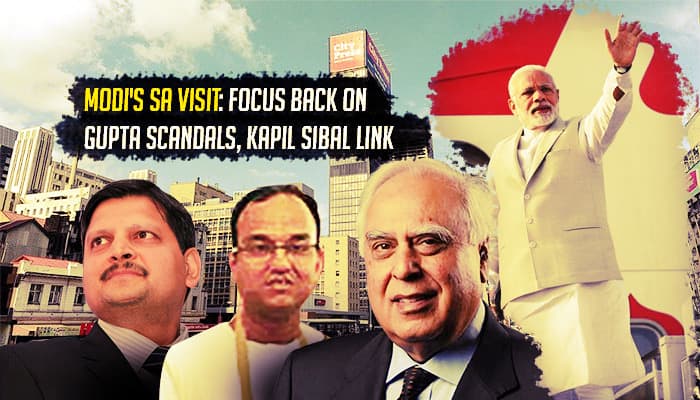Narendra Modi's upcoming Johannesburg visit brings into focus the cronyism and corruption of the infamous Gupta brothers who exploited political systems to build a massive empire as immigrants in South Africa, and collusion of that network with PSU banks and powerful politicians in India. There are lessons to be learnt
When PM Narendra Modi reaches Johannesburg on July 25 to attend the 10th BRICS Summit, history will not just watch what lies ahead, but also take a long, hard look into the past.
The story of Indians’ journey to South Africa has been both extraordinarily lifting and regrettably dark.
In 1893, a 23-year-old Mohandas Karamchand Gandhi reached Durban as a young lawyer. The world got its Mahatma.
Exactly a century later in 1993, another young man of 24 from Saharanpur in bustling, small-town Uttar Pradesh reached South Africa to set up business. Atul Gupta soon set up a formidable empire spanning computer equipment, media and mining, with brothers Ajay and Rajesh.
The story of Gupta Brothers has been tattooed into history with the darkest controversies, scams and brazen misuse of political and financial institutions not just in South Africa but also in India.
So profound was their influence on the Jacob Zuma regime that people started calling them ‘Zuptas’. They bagged multi-million-dollar contracts and got cronies into the South African Cabinet using that proximity.
Corruption piled up, both Gupta and Zuma families got richer. Not very different from the serious charges of nepotism and corruption certain political dynasties face in India.
Modi’s South Africa visit — right after he spoke in Parliament about UPA-era reckless “phone banking” which has crippled India’s banking system with lakhs of crores of non-performing assets (NPAs) — brings into sharp focus how the Guptas and their cronies abused public sector institutions back home like Bank of Baroda (BoB).
The Hindu reported in February that “interviews and documents obtained by reporters show that the bank’s South African branch issued unapproved loan guarantees, quashed internal compliance efforts, and prevented regulators from learning about suspicious transactions in a way that benefited the Guptas’ network”.
In March, Indian Income Tax authorities carried out several raids on the Guptas’ Saharanpur and Dehra Dun properties as part of a massive crackdown. BoB is reportedly winding up its South Africa operations in the wake of the financial scandal.
But more intriguingly, investigative reports by South African journalists, followed up in bits and parts by Indian media, reveal the alleged link between former UPA minister and Congress lawyer-politician Kapil Sibal and the murky world of the Guptas.
OpIndia.com recently reported on Sibal’s alleged involvement with Piyoosh Goyal, a shady tycoon and business associate of the Guptas. Sibal and his wife had allegedly bought a steal a company that owned land later valued at Rs 89 crore.
“Documents show that as on March 31, 2017, Kapil Sibal and Promila Sibal owned 50% shares each in a company called Grande Castello Private Limited, which was a 100% subsidiary of Worlds Window Impex India Pvt Ltd, the company controlled by Piyoosh Goyal and allegedly involved in money laundering for Guptas as per the South African publications. However, there is no direct link of Kapil Sibal with Worlds Window’s dealings with Guptas,” wrote Nupur Sharma, editor of OpIndia.
South African organisation for investigative journalism amaBhungane reported that, in 2011, Guptas chartered cricket World Cup flights between Delhi and Mumbai and bankrolled a luxury hotel splurge for Sibal and family.
“Kapil Sibal has refused to explain a business deal with Worlds Window, a firm that apparently helped the South African Guptas to launder hundreds of millions around the world,” amaBungane reported. “There is no evidence that Sibal was party to money laundering or corruption, but it is worth noting his refusal to explain a deal with Worlds Window… between 2010 and 2015, hundreds of millions of rand flowed between companies linked to the Guptas and Worlds Window. The money included Chinese kickbacks for Transnet crane and locomotive contracts. The transactions moved money between South Africa, China, UAE and India.”
Sibal was quoted as saying, “I have never had any dealings, financial or otherwise, with the Guptas. I have met Mr Gupta in Delhi only once when my friend Piyoosh Goyal invited me to watch the Cricket World Cup.”
So deep was Goyal and Guptas’ penetration into the Indian financial system under UPA that deputy managing director of the State Bank of India is under CBI investigation for allegedly accepting Rolex and Citizen watches and wads of cash in return for clearing a Rs 75-crore loan to Piyoosh Goyal’s Worlds Window group in 2013.
With such unbridled cronyism and corruption, little wonder that Indian banks are stooping under the weight of billions of rupees in NPAs.
South Africans can take comfort in the fact that Modi will be the first Indian PM to visit the nation after bringing one of the deepest economic reforms in India –– the Insolvency and Bankruptcy Code –– which could have prevented the wanton corruption and cronyism that forbids the system to pump in endless, unrecoverable loans in dubious ventures.
After a forgettable stint with an Indian family which set up business there, South Africa can look forward to a long journey of honest, enriching business with India and Indians across a calmer Indian Ocean.
Last Updated Jul 23, 2018, 5:09 PM IST












![Salman Khan sets stage on fire for Anant Ambani, Radhika Merchant pre-wedding festivities [WATCH] ATG](https://static-ai.asianetnews.com/images/01hr1hh8y86gvb4kbqgnyhc0w0/whatsapp-image-2024-03-03-at-12-24-37-pm_100x60xt.jpg)
![Pregnant Deepika Padukone dances with Ranveer Singh at Anant Ambani, Radhika Merchant pre-wedding bash [WATCH] ATG](https://static-ai.asianetnews.com/images/01hr1ffyd3nzqzgm6ba0k87vr8/whatsapp-image-2024-03-03-at-11-45-35-am_100x60xt.jpg)


